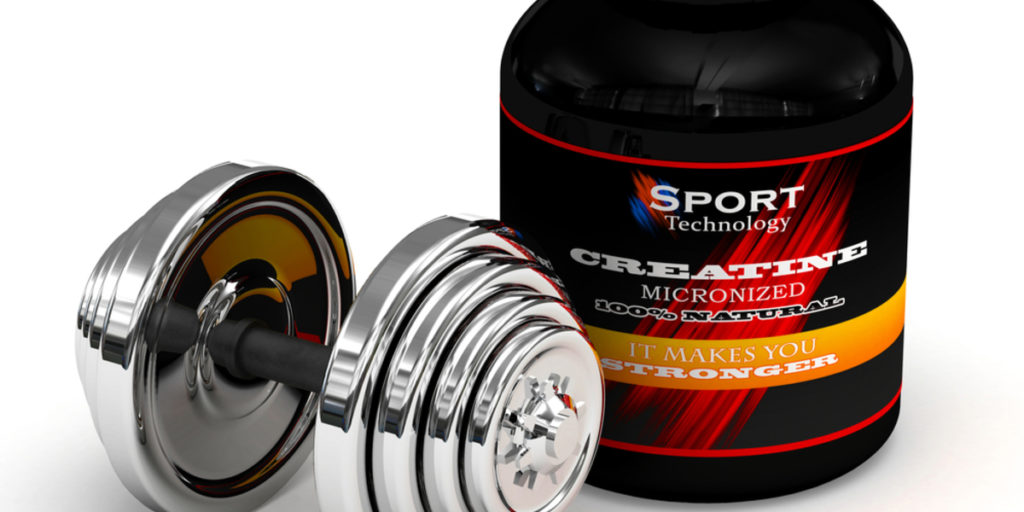The results of a new study called PRECREST, investigating whether the nutritional supplement creatine can slow Huntington’s disease progression, have just been published. Uniquely, this studied the effects of high-dose creatine supplementation in people carrying the HD mutation, but without clear disease symptoms.
Why creatine?
Scientists have noted for a long time that the HD mutation seems to cause problems with the energy levels of cells and tissues of the body. Scans that show energy usage in the brain reveal that sick parts of the brain are using less energy in HD patients.
A large body of experimental results since these early scans supports the idea that HD cells have problems maintaining sufficient energy levels. Not having enough energy is bad news that can rapidly lead to cells dying, especially for the extremely hard working cells of the brain.
To help regulate energy levels in times of stress, the body uses a chemical called “creatine”. Creatine acts as a sort of bank to store extra high-energy chemical bonds cells need to make energy. So, cells don’t actually burn creatine for energy but they use it as a place to store their extra energy for times of high demand.
History of creatine in HD
It occurred to scientists that if HD tissues are lacking energy, and creatine helps enlarge the bank of energy available, maybe they should study creatine as a possible treatment for HD. In fact, as early as 1998 scientists described studies using HD mice treated with creatine that showed some improvement.
These early successes in animals suggested that it’d be worth testing creatine in human HD patients. Also, unlike many other drugs, creatine is a substance normally made in the body, so this type of treatment ought to be relatively safe.
To date, multiple trials of creatine in human HD patients have been run. Generally, these studies show that at the tested doses (5-10g/day) creatine gets into the body, but fails to have significant beneficial effects for patients.
One possible problem with these early studies is that they were conducted in patients who had already developed signs of HD. Maybe the trials were started too late to have beneficial effects?
Another concern of scientists was data from other diseases suggesting that creatine could be taken in pretty huge doses — even as high as 30 grams a day — in order to reach the brain. Maybe the early studies in human patients just didn’t use enough creatine to be effective?
Now, 30 grams of any kind of treatment is a lot of drug to take! A full-strength aspirin delivers less than half a gram of active drug. So to get 30 grams of aspirin, you’d have to take nearly a hundred of them. Don’t try this at home!
Novel trial design
The recently described study set out to address limitations of earlier studies. First, the study was conducted using subjects at risk of developing HD, who haven’t yet developed symptoms. Secondly, the study was designed to give people an increasing dose of creatine, up to 30 grams a day (taken as two 15 gram doses).
A unique feature of this trial was the fact that people from HD families were allowed to participate without first being genetically tested to confirm they carry the mutation. Previous HD studies have been conducted using people with obvious symptoms of HD, or people who had undergone predictive testing and know they carry the mutation.
In PRECREST, study participants at risk of HD were allowed to enroll without undergoing predictive testing for the mutation. Generally, regulatory agencies frown on the administration of experimental drugs to healthy controls, so this type of trial design is very rare.
In this case, because creatine was widely considered a “safe” treatment, the study review board approved it. It seems unlikely that this trial design could be replicated when testing more experimental drugs in the future, given the potential risks to people who don’t have the HD mutation.
What were the good effects?
The study followed participants for up to 18 months after starting high-dose creatine. Some participants started taking creatine right away, while others took a placebo for a year and then switched to creatine later in the study.
Throughout the study, scientists examined the participants for changes associated with carrying the HD mutation. We know from long-term observation of HD mutation carriers that even before someone is diagnosed with HD they have changes in their thinking, memory and in the shape of their brain.
Specifically, certain deep parts of the brain shrink in HD mutation carriers, and the outer wrinkly part of the brain (the “cortex”) thins a bit. The long “wires” interconnecting parts of the brain (called “white matter” by scientists), also seem to be disrupted early in the brains of HD mutation carriers.
After taking a high dose of creatine for between 1-2 years participants with the HD mutation showed slower shrinkage of deep parts of the brain, and less thinning of the cortex. These areas still shrank, but at a slower rate. These effects were only seen in HD mutation carriers, and not those subjects taking creatine without the HD mutation.
That sounds great, but it’s important to ask whether the change in shrinkage is really evidence that the disease process has been slowed. It’s possible that creatine causes HD brain cells to bulge or swell without making them healthier. Swelling like that could produce false optimism and might even be harmful. That’s not something this trial can tell us either way, because the patients weren’t followed long enough to see whether creatine treatment delayed the onset of symptoms.
What were the bad effects?
As in any complex study like this, there is both good and bad news. First, a significant proportion of the subjects had a hard time taking high doses of creatine every day, experiencing stomach problems and other complications, though none of them were severe.
Changes in thinking and memory performance previously seen in HD mutation carriers were seen again in this study. Compared to subjects without the mutation, people with it seemed to have a bit tougher time with memory and thinking tests. Unfortunately, creatine administration didn’t help any of these problems, despite having seemed to help brain shrinkage. That’s a shame because it makes the scan changes impossible to interpret with confidence.
Similarly, the authors confirmed that people carrying the HD mutation have disruptions in the wiring between brain regions. Creatine supplementation didn’t help make those problems better.
So, should we be taking creatine?
This study investigated an important idea, which is that high-dose creatine supplementation might slow the progression of changes in people carrying the HD mutation. Several brain-shrinkage-related changes were made better, but observed changes in brain wiring and thinking ability didn’t improve.
Should HD-affected people start taking high-dose creatine on the basis of this study? No. We don’t know what the scan changes mean, and we don’t think it’s safe to conclude that creatine has slowed the progression of HD on the basis of PRECREST. What’s more, taking high-dose creatine is no picnic, as the high levels of side effects show.
Another, larger, study of creatine called CREST-E is ongoing. CREST-E will help us decide what the scan changes mean, especially if the same brain shrinkage benefits are seen alongside changes in symptoms of HD mutation carriers.







